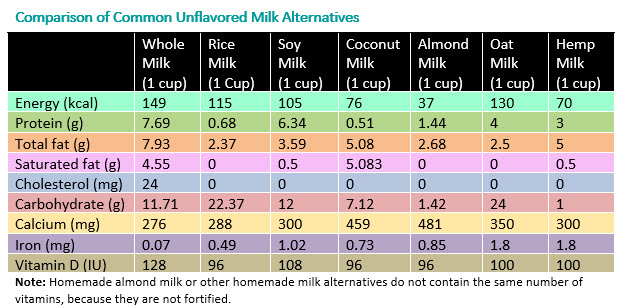
 Milk is a grocery list staple for many families. But, many infants and children are allergic to milk protein or unable to digest the sugar in cow's milk. Some avoid it for other health concerns—or simply because they don't like the taste. These families can choose from a growing array of cow's milk alternatives that now fill the dairy aisle.
Milk is a grocery list staple for many families. But, many infants and children are allergic to milk protein or unable to digest the sugar in cow's milk. Some avoid it for other health concerns—or simply because they don't like the taste. These families can choose from a growing array of cow's milk alternatives that now fill the dairy aisle.
The nutritional content in the various dairy alternative products is important for parents to be aware of when shopping. Choices range from other animal-based beverages (e.g., goat's milk) to products made from nuts (e.g., almond milk), beans (e.g., soy milk), grains, and other plants.
The American Academy of Pediatrics (AAP) knows that deciding what's best for your family can be confusing. To help you sort it all out, here are frequently asked questions from parents about cow's milk alternatives.
When do I introduce cow's milk into my baby's diet?
The AAP recommends breastmilk as the sole source of nutrition for your baby for about the first 6 months. If a baby is breastfed by a mother who is drinking cow's milk, or is formula fed with traditional infant formula, he or she has already been exposed to cow's milk protein. Most babies can begin consuming dairy foods around 6 months of age — after a few first solid foods have been introduced. Plain, whole-fat or whole Greek yogurt is a good first form of cow's milk protein for babies to try. Avoid the added sugar commonly found in yogurt marketed to babies and toddlers.
Once a baby is developmentally able to eat finger foods, other dairy — such as pieces of cheese — can be added. The AAP recommends that whole cow's milk and low-iron formulas not be used during the first year of life, because babies' digestive systems under age 1 may not tolerate the cow's milk protein in large quantities. Low-iron formulas can also lead to anemia. Note: Low-iron formulas are no longer marketed routinely in the United States.
What if my baby is allergic to cow's milk?
If your formula-fed baby has a cow's milk allergy, ask your pediatrician about switching to a non-cow's milk, protein-based formula. Hypoallergenic formulas are cow's milk based; only soy formulas are not. Discuss these options with your child's pediatrician before switching.
According to a study published in Pediatrics, there is not enough evidence for breastfeeding mothers to routinely avoid allergenic foods—like cow's milk—while breastfeeding.
If your pediatrician diagnoses your baby with a cow's milk protein allergy, then he or she may recommend you remove cow's milk from your diet while breastfeeding. Be aware that it can take several weeks for the milk protein to disappear entirely. The AAP does not currently have an official recommendation on this issue.
After your baby's first birthday, he or she may begin using cow's milk alternatives or occasionally change to a toddler version of the formulas mentioned above.
What kinds of cow's milk alternatives are available?
While soy milk has traditionally been the most commonly used cow's milk alternative, there are many options available. Use of tree nut milk, including almond and cashew milks, have become increasingly popular. Rice and oat milk, as well as hemp milk, are also possible alternatives. Some of these alternatives are flavored, for example with chocolate and vanilla, however these contain added sugar and calories.
What are the differences among cow's milk alternatives?
Cow's milk alternatives often contain less protein and less calories in comparison to cow's milk. Most are fortified with vitamin D and calcium. It is important to check labels since protein and vitamin content may differ among brands. See the chart for a comparison of common unflavored milk alternatives.

How much dairy is recommended for my child?
Infants' diets primarily consist of dairy to help them meet their caloric needs for growth. In addition, dairy provides enough fat needed for brain and eye development.
-
At one year, babies should consume approximately 2 servings of dairy per day, or about 16 to a maximum of 24 ounces of whole milk per day. Whole-fat milk is recommended for children at this age, unless there is a family history or risk for obesity or heart disease. Talk with your child's pediatrician about which milk he or she recommends for your one-year-old child.
-
Between two and three years old, children should consume 2.5 servings of dairy per day. The AAP recommends that children stay on whole milk until they are two years of age — unless there is a reason to switch to low-fat milk sooner. Whole milk contains approximately 4% milk fat. It may help to gradually switch your child from whole milk to a lower-fat milk. Therefore, many pediatricians recommend that children get reduced fat (2%) milk for a few weeks before switching them to low fat (1%) or no fat (skim) milk. If children cannot drink cow's milk, they can meet their dairy requirements by eating yogurt and cheese, but vitamin D may be needed as a supplement since not all yogurts are fully supplemented with vitamin D. Talk with your child pediatrician before giving your child any supplements.
How much calcium and vitamin D are recommended for my child to eat each day?
The specific amount is based on your child's age. Here is a breakdown of the recommended dietary allowances (RDA) for calcium and vitamin D.

Our Providers
Expecting?
News
Patient Forms
Contact Us
Privacy
8:00am - 6:00pm
Fri:
8:00am - 5:00pm
Sat-Sun:
Call to Schedule
8:15am - 9:30am











